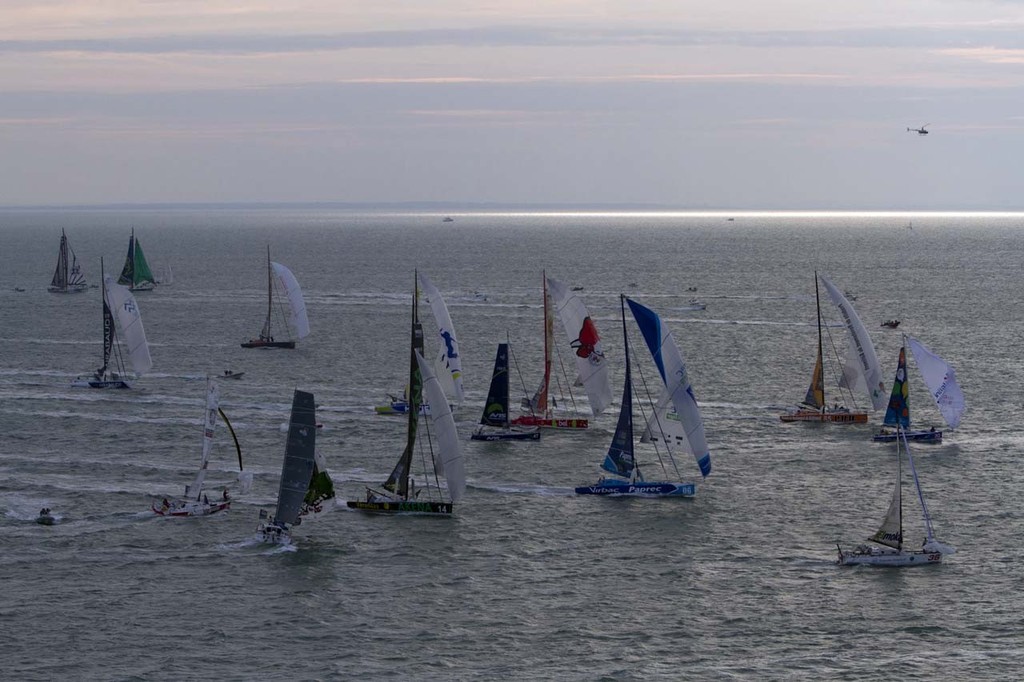Transat Jacques Vabre - The return to real core values
by Transat Jacques Vabre on 16 Jul 2013

Transat Jacques Vabre Alexis Courcoux
The Transat Jacques Vabre transatlantic race returns to its real core values for the 20th anniversary edition, offering a totally free course between Le Havre, France and Itajaí, Brazil, for four different classes of monohulls and multihulls.
In total more than one week of events at the start are planned for the public in Le Havre and three weeks of festivities and popular events at the finish in Itajaí.
The 20th edition of the popular Transat Jacques Vabre is a race for two people with three separate starts for four different classes. The 2013 race builds on previous editions setting the longest ever course between the traditional, popular start port of Le Havre and Brazil. The finish is in Itajaí, south of Rio de Janeiro, a course distance of 5400 miles – with no waypoints – across the Atlantic Ocean for the four different classes which are expected to form a fleet of more than 40 boats.
In the tradition of past Transat Jacques Vabre races, Sports Director Manfred Ramspacher and Sylvie Viant, the Race Director, have met with representatives of the four classes to plan the four staggered starts so that four classes will arrive in Itajaí in close order.
'We talked a lot with the four classes to define the best format: the start of monohulls and be on Sunday, November 3. On a preliminary route between Le Havre and Etretat (43m NE of Le Havre the multihulls will take part in a prologue but then as the IMOCA 60 'and Class 40 head for Brazil, the multihulls will return to Le Havre’s Paul Vatine Basin,' says Ramspacher
Then the scheduled departure for Multi50s is Tuesday, November 5 and the MOD70 Friday, November 8.
Then on this open course of 5400 miles, it should take between 12 and 25 days for the four class winners because this eleventh edition of the Transat Jacques Vabre is the longest in its history. Previous races went to Cartagena (Colombia) between 1993 and 1999 on a course of 4890 miles, Salvador de Bahia (Brazil) 2001 and 2007 at 4770 miles, and then in 2009 and 2011 to Puerto Limon (Costa Rica) the course distance was 4730 miles ...
'We wanted to preserve the spirit of this classic transatlantic race by organising staggered starts to really draw a focus the event at the start and the finish. The Transat Jacques Vabre is a multi-class race with four winners: all crews will be met at the finish from 19 November to 8 December. '
'After enjoying a full week of events around the famous Paul Vatine Basin in Le Havre, co-skippers – the top names in the world of short handed sailing – will offer a great public maritime festival on start day Sunday, November 3rd. It will be huge.' says Edouard Philippe, the Deputy Mayor of Le Havre. The Transat Jacques Vabre is as much of an event on land as on the sea!
Clotilde Bednarek, Marketing Director Café Mondelez International, adds: 'The 20th anniversary of the Transat Jacques Vabre will be celebrated with a great spirit and ambience on the docks of Le Havre as it will also on the arrival in Itajaí. The spirit and legacy of each edition are underpinned by the sailors who bring the fabulous values of human endeavour and adventure. We look forward to joining the rhythm of the competition that we share during the passage across the Atlantic. '
Alongside the pure sports competition and the human challenge, the Transat Jacques Vabre is also an event with a very strong eco-friendly message: since 2007 effective measures have been put in place to limit and to offset its carbon footprint by encouraging the support of sponsors and stakeholders in the event. The reduction of CO2 emissions has been a major objective for all participants of all types who are associated with or in the race. A comprehensive system for sustainable development was established by the organisation and very discrete initiatives on transport, energy, water, waste management, use of recycled or recyclable materials as well as developing educational programmes and public relations communication. CO2 emissions have also been offset (100% of CO2 emissions of the organization) through reforestation operations in tropical forests. In 2013, this action for environmental progress continues with the same intensity and breadth of actions.
Dates for your diary
October 26: Grand opening of public village Le Havre
October 26-27: Exhibition race in the basin of the Eure
November 3: Start of the Transat Jacques Vabre
November 18: Grand opening of village public Itajai
Third week of Nov: Estimated finish date of the first boats
November 30: Postlogue and first prizegiving in Itajai
December 7: Official Prizegiving in
Event website
If you want to link to this article then please use this URL: www.sail-world.com/112029